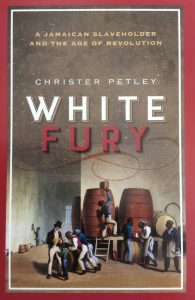 Simon Taylor, who claimed ownership of over 2,248 enslaved people in Jamaica at the point of his death in 1813, was one of the wealthiest slaveholders ever to have lived in the British empire. In White Fury, Christer Petley uses Taylor’s rich and expressive letters to allow us an intimate glimpse into the aspirations and frustrations of a wealthy and powerful British slaveholder during the Age of Revolution. The letters provide a fascinating insight into the merciless machinery and unpredictable hazards of the Jamaican plantation world; into the ambitions of planters who used the great wealth they extracted from Jamaica to join the ranks of the British elite; and into the impact of wars, revolutions, and fierce political struggles that led, eventually, to the reform of the exploitative slave system that Taylor had helped build . . . and which he defended right up until the last weak scratches of his pen.
Simon Taylor, who claimed ownership of over 2,248 enslaved people in Jamaica at the point of his death in 1813, was one of the wealthiest slaveholders ever to have lived in the British empire. In White Fury, Christer Petley uses Taylor’s rich and expressive letters to allow us an intimate glimpse into the aspirations and frustrations of a wealthy and powerful British slaveholder during the Age of Revolution. The letters provide a fascinating insight into the merciless machinery and unpredictable hazards of the Jamaican plantation world; into the ambitions of planters who used the great wealth they extracted from Jamaica to join the ranks of the British elite; and into the impact of wars, revolutions, and fierce political struggles that led, eventually, to the reform of the exploitative slave system that Taylor had helped build . . . and which he defended right up until the last weak scratches of his pen.
Reviews:
“A subtle, sensitive and marvellously evocative biography of Jamaica’s richest and most powerful planter, bringing powerfully to life the brutal but highly productive slave system which undergirded the success of the British Empire in the late eighteenth century.” – Trevor Burnard, University of Melbourne
“A revealing and persuasive account of one man’s life at the centre of Britains slave empire in the Caribbean. In subtly tracing Simon Taylor’s ‘white fury’ provoked by the movement for abolition Petley offers an original and provocative account of British slavery as it entered its death throes.” – James Walvin, author of A Short History of Slavery
“[A]n exceptional book that will become a major point of reference for historians of the 18th-century Caribbean and scholars investigating the sudden abolition of the British slave trade in 1807… White Fury is a powerful contribution to scholarship on the British Atlantic in the age of revolutions, and it deserves to be widely read.” – Reviews in History
 Slaveholders in Jamaica is the first full length study of one of the most controversial and important colonial groups in British imperial history. The slaveholders of Jamaica played a central role in the struggle to end Caribbean slavery. They were therefore integral to the reinvention of the British empire in the period after the American Revolution.
Slaveholders in Jamaica is the first full length study of one of the most controversial and important colonial groups in British imperial history. The slaveholders of Jamaica played a central role in the struggle to end Caribbean slavery. They were therefore integral to the reinvention of the British empire in the period after the American Revolution.
Contributions by slaveholders to these significant episodes in world history were generally in opposition to reform. They resisted calls for change and fought back against efforts to end slave trading and to abolish slavery. Their actions and words had a profound and lasting effect, nevertheless. In the Caribbean, social and economic divisions created by slavery persisted after emancipation. Meanwhile, in the wider British imperial world, ideas about racial difference, first put to work in defence of slavery, continued to shape how Europeans saw their empires.
The Jamaican slaveholders experienced a profound reversal in their fortunes as Britain and the wider empire experienced rapid transformations. For most of the eighteenth century, they were a powerful and influential group; slavery was an accepted part of British colonial activity. This changed quickly in the years after the American Revolutionary War (which ended in 1783), with the rise of the British abolition movement. Campaigns led by well-know figures such as William Wilberforce, combined with resistance by slaves in the Caribbean, undermined slaveholders’ prestige and attacked their vital interests, resulting in the ending of the slave trade in 1807 and culminating in a shattering political defeat with the passage of the Emancipation Bill in 1833.
The book focuses on this half-century of momentous change, examining colonial society and culture, including the ways in which slaveholders sought to maintain their domination and control over a slave society. It explodes the myth that most slaveholders were wealthy planters, showing that many ordinary men and women owned slaves. It looks at the political struggles between slaveholders and abolitionists and provides a detailed exploration of the slaveholders’ struggles with slaves and free people of colour in Jamaica. These Caribbean conflicts are an often-overlooked aspect of the conflict over slavery that help to provide new perspectives on the struggle for freedom in the nineteenth-century British empire.